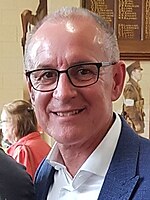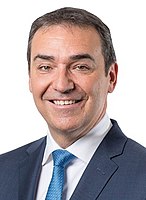| |||||||||||||||||||||||||||||||||||||||||||
All 47 seats in the South Australian House of Assembly 24 seats are needed for a majority 11 (of the 22) seats in the South Australian Legislative Council | |||||||||||||||||||||||||||||||||||||||||||
|---|---|---|---|---|---|---|---|---|---|---|---|---|---|---|---|---|---|---|---|---|---|---|---|---|---|---|---|---|---|---|---|---|---|---|---|---|---|---|---|---|---|---|---|
| |||||||||||||||||||||||||||||||||||||||||||
 The left side map shows the first party preference by electorate. The right side map shows the final two-party preferred vote result by electorate. | |||||||||||||||||||||||||||||||||||||||||||
| |||||||||||||||||||||||||||||||||||||||||||
The 2014 South Australian state election elected members to the 53rd Parliament of South Australia on 15 March 2014, to fill all 47 seats in the House of Assembly (lower house) and 11 of 22 seats in the Legislative Council (upper house). The 12-year-incumbent Australian Labor Party (SA) government, led by Premier Jay Weatherill, won its fourth consecutive four-year term in government, a record 16 years of Labor government, defeating the opposition Liberal Party of Australia (SA), led by Opposition Leader Steven Marshall.
The election resulted in a hung parliament with 23 seats for Labor and 22 for the Liberals. The balance of power rested with the two crossbench independents, Bob Such and Geoff Brock. Such did not indicate whom he would support in a minority government before he went on medical leave for a brain tumour, diagnosed one week after the election. University of Adelaide Professor and Political Commentator Clem McIntyre said the absence of Such virtually guaranteed that Brock would back Labor – with 24 seats required to govern, Brock duly provided support to the incumbent Labor government, allowing Weatherill to continue in office as head of a minority government. McIntyre said:[1]
If Geoff Brock had gone with the Liberals, then the Parliament would have effectively been tied 23 to 23, so once Bob Such became ill and stepped away then Geoff Brock, I think had no choice but to side with Labor.
It is Labor's longest-serving South Australian government and the second longest-serving South Australian government behind the Playmander-assisted Liberal and Country League government of 1933-1965, which served first under Richard Layton Butler and then Thomas Playford IV. It is also the third time that any party has won four consecutive election victories in South Australia, after the LCL's 10 consecutive victories from 1933 to 1965 (the last eight under Playford) and Labor's four consecutive victories between 1970 and 1977 under Don Dunstan.
Recent hung parliaments occurred when Labor came to government in 2002 and prior to that when the state Liberal retained government in 1997 which saw the South Australian Division of the Liberal Party of Australia, created in 1974, win re-election for the first time.
The Liberals were reduced to 21 seats in May 2014 when Martin Hamilton-Smith became an independent and entered cabinet with Brock. Both Hamilton-Smith and Brock agreed to support the Labor government on confidence and supply while retaining the right to otherwise vote on conscience. Labor went from minority to majority government when Nat Cook won the 2014 Fisher by-election by five votes from a 7.3 percent two-party swing which was triggered by the death of Such. Despite this, the Jay Weatherill Labor government kept Brock and Hamilton-Smith in cabinet, giving the government a 26 to 21 parliamentary majority.
Like federal elections, South Australia has compulsory voting, uses full-preference instant-runoff voting in the lower house and single transferable vote group voting tickets in the proportionally represented upper house. The election was conducted by the Electoral Commission of South Australia (ECSA), an independent body answerable to Parliament.

